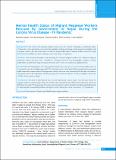Please use this identifier to cite or link to this item:
https://hdl.handle.net/20.500.14356/1177Full metadata record
| DC Field | Value | Language |
|---|---|---|
| dc.contributor.author | Kaphle, Maheshor | - |
| dc.contributor.author | Karmacharya, Isha | - |
| dc.contributor.author | Khadka, Santosh | - |
| dc.contributor.author | Shrestha, Bikal | - |
| dc.contributor.author | Adhikari, Laxmi | - |
| dc.date.accessioned | 2023-05-02T06:44:50Z | - |
| dc.date.available | 2023-05-02T06:44:50Z | - |
| dc.date.issued | 2021 | - |
| dc.identifier.citation | KaphleM., KarmacharyaI., KhadkaS., ShresthaB., & AdhikariL. (2022). Mental Health Status of Migrant Nepalese Workers Rescued By Government of Nepal During the Corona Virus disease -19 Pandemic. Journal of Nepal Health Research Council, 19(04), 669-674. https://doi.org/10.33314/jnhrc.v19i04.3552 | en_US |
| dc.identifier.issn | Print ISSN: 1727-5482; Online ISSN: 1999-6217 | - |
| dc.identifier.uri | http://103.69.126.140:8080/handle/20.500.14356/1177 | - |
| dc.description | Original Article | en_US |
| dc.description.abstract | Abstract Background: The corona virus pandemic rapidly sweeps across the world; it is inducing a considerable degree of depression, stress and anxiety concern in the population at large and among certain groups in particular, such as migrant workers. The aim of the study is to find out mental health status of migrant workers rescued by Nepal Government from different countries during corona virus disease -19 pandemic. Methods: Cross-sectional descriptive study involving 427 returned migrant workers was conducted using the depression, anxiety and stress scale –21(DASS-21). Association between socio-demographic variables to mental health status was performed using chi-square test and p-value <0.05 was considered as significant level. Results: Out of 427 participants, 4 % of respondents found to have extremely severe level of stress followed by 1.9 % extremely severe level of depression and 2.3% extremely severe level of anxiety. The association between mental health status and covariates showed that depression, anxiety and stress were associated with the place of residence, educational status of the respondents, and their perception of corona virus disease -19 risk at workplace, and test for COVID-19 after arrival to Nepal. Conclusions: The study revealed that job loss, visa and employment contract expiry were the main reasons for migrant workers to return Nepal. Nearly one fourth of the respondents had suffered from depression, nearly one third from stress and 17% from anxiety. Necessary psychosocial interventions should be formulated and implemented for addressing the mental health problems of migrant workers during the corona virus disease -19-19 pandemic. Keywords: Government of Nepal; mental health status; migrant workers | en_US |
| dc.language.iso | en | en_US |
| dc.publisher | Nepal Health Research Council | en_US |
| dc.relation.ispartofseries | Oct-December,2021;3552 | - |
| dc.subject | Government of Nepal | en_US |
| dc.subject | mental health status | en_US |
| dc.subject | migrant workers | en_US |
| dc.title | Mental Health Status of Migrant Nepalese Workers Rescued By Government of Nepal During the Corona Virus disease -19 Pandemic | en_US |
| dc.type | Journal Article | en_US |
| local.journal.category | Original Article | - |
| Appears in Collections: | Vol. 19 No. 04 (2021): Vol 19 No 4 Issue 53 Oct-Dec 2021 | |
Files in This Item:
| File | Description | Size | Format | |
|---|---|---|---|---|
| 3552-Manuscript-26768-3-10-20220420.pdf | Fulltext Download | 254.33 kB | Adobe PDF |  View/Open |
Items in DSpace are protected by copyright, with all rights reserved, unless otherwise indicated.
